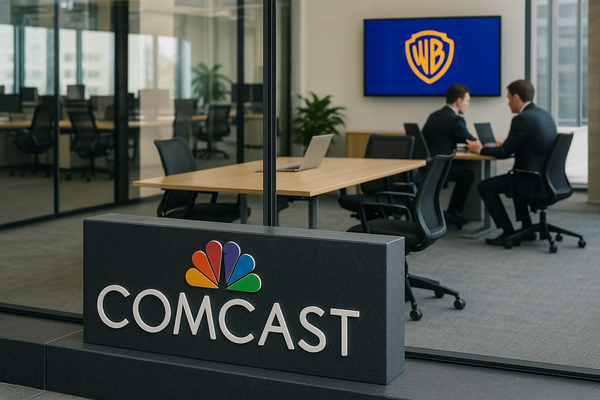
Comcast is weighing a potential purchase of Warner Bros. Discovery’s studio and streaming businesses, a move that would come as Comcast has hired Goldman Sachs and Morgan Stanley to advise on the opportunity. The talks add urgency to a market already watching Warner Bros. Discovery’s Q3 results: revenue fell to $9.05 billion, down 6% year-over-year, and the company posted a $148 million quarterly loss. Short-term, the story matters because bank engagement signals a live process that could reshape content ownership before the holiday film season and ahead of Warner’s planned mid‑2026 split. Longer-term, the deal would concentrate IP and distribution power in a handful of global media owners, with implications for licensing fees, game tie-ins and developer royalties worldwide. In the US, a combined Comcast–WBD would increase negotiating leverage with streaming platforms; in Europe and Asia it could accelerate bundling of TV and broadband services. Historically, studio consolidations (and subsequent licensing resets) have lifted franchise valuations for three to five years; investors are comparing current chatter to past M&A cycles as they price stocks and reweight exposure to content owners and game publishers.
Comcast’s strategic moves and immediate signals
Comcast’s decision to retain Goldman Sachs and Morgan Stanley is a clear quantifiable signal. Hiring two lead advisers typically costs tens of millions and shows a firm approach to due diligence. Reuters reports that Comcast has gained access to Warner’s financial information as part of the review. Separately, Comcast is active on consumer retail: the company opened its first Xfinity store in San Bruno and announced a $15,000 community contribution at the grand opening, underlining a continued push into direct customer channels. Market reaction has been fast: Comcast’s media‑related headlines account for eight items in the dataset this week, and speculative flows have lifted trading volumes in related names, with buyers focusing on potential synergies in advertising, distribution and subscription bundles.
What Warner Bros. Discovery’s Q3 numbers mean for a deal
Warner Bros. Discovery reported Q3 revenue of $9.05 billion, a 6% decline year-over-year, and a GAAP loss of $0.06 per share as the company posted a $148 million quarterly loss. The studios business, however, climbed 24% with box-office receipts topping $4 billion for the period. Management signaled that splitting the company into two entities by mid‑2026 remains on track and is actively exploring asset sales. These figures matter: a buyer would acquire a segment generating multi‑billion dollar studio revenues and a streaming arm that missed subscriber growth expectations, which helps explain why suitors are focused on carved‑out bids. For example, a buyer valuing the studio business might apply historical studios multiples (often in the mid‑teens EV/EBITDA when box office and licensing are strong) to the $4+ billion box office and related distribution revenue streams, while treating streaming as a separate, lower‑multiple growth play.
Content pipeline risk and how game publishers reacted
Investors are pricing content risk into game publishers and entertainment partners. Take‑Two reported fiscal Q2 sales of $1.77 billion, up 20.3% year-over-year, and adjusted EPS of $1.46, but GAAP results showed a loss of $0.73 per diluted share. The company raised full‑year guidance, yet the six‑month delay of Grand Theft Auto VI to November 2026 sent shares down roughly 7% in aftermarket trading. That move illustrates the sensitivity of game stocks to timing changes: a single AAA release delay can shift quarterly revenue recognition by hundreds of millions. If Comcast acquires WBD’s studio assets, licensors and publishers that depend on film and TV tie‑ins — which can drive in‑game events, cross‑promotions and DLC sales — would face a new counterparty with more bargaining power. Investors are already comparing the Take‑Two performance gap and the timing risk to previous franchise postponements, and trading desks are adjusting exposure accordingly.
Tech demand, cloud growth and AI security spend
Technology trends add context to the deal chatter. Datadog forecast fourth‑quarter earnings above Wall Street estimates, citing strong AI‑driven security demand; its shares had risen 8.5% year-to-date and jumped nearly 10% in premarket trade after the forecast. Meanwhile, Morgan Stanley projects Google Cloud could grow by more than 50% in 2026, a rate that would keep enterprise spend on cloud infrastructure elevated. Those numbers matter because any new owner of large studio and streaming assets will need scale in cloud, content delivery and security to control costs. Acquirers often model multi‑year capex and operating expense synergies; higher cloud growth and rising security budgets can compress or expand those projected savings. Technology providers supplying monitoring, security and AI tooling therefore stand to gain from increased demand tied to a combined Comcast–WBD platform.
Investor positioning and near‑term scenarios
Market participants are reacting in quantifiable ways. Take‑Two shares fell about 7% after the GTA delay announcement despite a 20.3% rise in quarterly sales, showing how heavily outcomes and release calendars influence valuations. Datadog’s stock moved nearly 10% intraday on a single-quarter forecast for AI security, highlighting the market’s sensitivity to AI‑related revenue upside. Legacy media names showed mixed flows: Warner’s Q3 top line of $9.05 billion and $148 million loss left some hedge funds trimming exposure, while bidders’ advisers being engaged typically raises takeover‑style calculations, which can widen bid/ask spreads and increase takeover premium expectations. Analysts and trading desks are watching metrics such as studio EBITDA margins, streaming ARPU, subscriber churn rates and franchise release calendars — all numeric levers that will determine whether a transaction clears regulatory and economic hurdles.
Comcast’s scouting of Warner Bros. Discovery is an active development that ties together content economics, game release scheduling and cloud‑service demand. Short‑term, the story has heightened volumes and re‑rated certain stocks tied to content and AI tools; long‑term, any deal would reconfigure rights, licensing revenue and streaming cost structures across the US, Europe and key international markets. For investors and corporate partners, the math will come down to box office and streaming revenue trajectories, studio EBITDA multiples and the cost base for cloud and security services.












